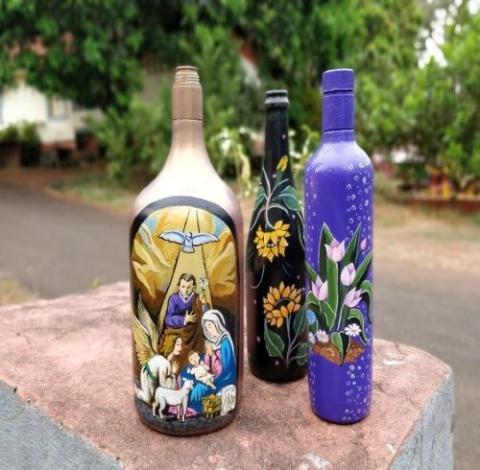
Sr. Monica Coelho of the Sisters of Holy Family of Nazareth of Sancoale Goa, India, with students at the Centre for the Differently Abled, a project of Caritas Goa. (Courtesy of Centre for the Differently Abled)
Walking down the hill to the Basilica of Bom Jesus in Old Goa, India, during the St. Francis Xavier novena, I recognized her from the newspaper: Sr. Monica Coelho of the Sisters of Holy Family of Nazareth of Sancoale Goa, India. She works at the Centre for the Differently Abled, a project of Caritas Goa.
I was curious about her life journey of nearly three decades, and asked if she could share her experience working with the differently abled. This sharing of her journey was like the walk to Emmaus when Jesus enlightened the two disciples before they returned to Jerusalem. Sharing her journey should encourage anyone to work with passion and dedication for the cause of humanity, to walk together in communion, listening with their heart for a greater mission. I would sum up this journey in the light of the Gospel: "Whatsoever you do to the least of my brethren that you do unto me" (Matthew 25: 40)
Sister Monica explained that she actually did not choose the work, but accepted the assignment out of obedience, not being aware of what awaited her. Comparing her work to the grain of wheat (John 12: 24), she said she had no regrets. Looking back since 1995, she realized that a student, Fulrani Kinalekar, was an inspiration, and a teacher, Sr. Meena Dias, was her encouragement. However, it was the late Sr. Mary Jane — then superior general — who was the "seer" who saw her tender love, compassion and possibilities to nurture the differently abled.
When she began at the center she never thought she would continue, because she was very disturbed at seeing the children with various disabilities, the majority hearing impaired. She was not qualified to work or communicate with them, though she pursued those studies later to become the principal of the higher secondary school.
As she struggled, a student with no limbs and unable to care for herself was admitted; Fulrani Kinalekar, 5, was from Pernem Bardez, a village in North Goa. The sight of her shattered Sister Monica, filling her heart with pity and helplessness and even disturbing her prayers. She silently made plans to leave that world of tears, questioning God: "Why would you create a life so incomplete? What a waste of a life!"
But then she heard a strong inner voice whispering, "Accordingly have I made you to complete what is incomplete." And she moved from quitting to embracing this noble cause. Thus it was that Fulrani Kinalekar became her inspiration.

Center students painted these bottles. (Courtesy of Centre for the Differently Abled)
It is not easy to work with the children: They often don't cooperate. Even after winning their confidence with time and effort, a steady supply of love and discipline, study and consistent work are still needed — and sometimes the efforts still fail. She said that is why they only admit children 5 to 13 years old, because early intervention is needed to modify their behavior patterns.
Eager to share, Sister Monica explained that every child has the right to education and is admitted to school, provided they have a disability certificate and can complete the higher secondary education recognized by the Goa Board of Education. In addition to education, they provide skills training and therapy, depending on the students' needs.
They also teach various vocational skills like Matty embroidery, crochet, cane technology, hand embroidery, art, and emboss work, glass painting, recycled handmade cards, flower making, bamboo wood carving, bakery goods, bottle painting, and candle making. Job placement (in the center or elsewhere) is also available. Opportunities are provided in academics, dance, sports, painting, creative works, poster contests and various ways to participate in competitions at school or intramurally, and at state, national and international levels.
This doesn't mean there are no difficulties. There are many challenges in working with these special children, such as temper tantrums, hyperactivity, aggression, short attention spans, screaming, biting, spitting and various kinds of childish misbehavior.
I wanted to know more and could feel my heart beat faster. I asked about the pandemic. She explained that around 60 students were living in the hostel. Most of the boarding students were kept there since they were not able to go home. Others had to take board exams. The students used hand sanitizer, good hygiene and proper social distancing during the pandemic and were taught about COVID norms.

Students work on embroidery projects, one of many activities at class at the Centre for the Differently Abled. (Courtesy of Centre for the Differently Abled)
Families who couldn't support themselves due to loss of jobs were provided with the basic necessities, especially food and study materials. Students who couldn't afford smartphones for online studies were allowed to use the hostel, and offline teaching was begun. The families who could not keep their children at home were provided hostel rooms and given care and attention. Phone calls were made to the parents to keep in touch with students during the pandemic. This year they have 254 students with special needs.
Sister Monica expressed her gratitude to God for the tremendous job satisfaction God has given her, blessing her generosity in serving these children. The awards she has received speak about her services. They include recognition for her work as a headmistress, literacy and education efforts and work with children with disabilities.
She has been leading the institution very successfully for the last 21 years and the secondary school (10th grade) results speak volumes as they secured 100% results (no students failed) for the last 12 consecutive years. The higher secondary school bagged 100% results for the last two consecutive years. Students have also achieved significant laurels at the state, national and international levels in football, basketball, badminton, shot put and other athletics.
Advertisement
In serving the marginalized and differently abled through the project of Caritas Goa with dedication and commitment, she has made the children independent in activities of daily living.
She also has enabled them to become contributing members of society by tapping their hidden potential.
Passion and compassion fueled Sister Monica to journey this many years with great zeal, and she has surely "given until it hurts," like the candle that burns out. She is like the grain of wheat that produces much fruit, while burning with joy.
As we celebrate the joy and peace of the Risen Lord, may we look at our journey and find the presence of Jesus in each and every circumstance, no matter how dark they may seem. Because every dark cloud has a silver lining. I thank God for the beautiful person of Sr. Monica, who is a blessing for the differently abled.





